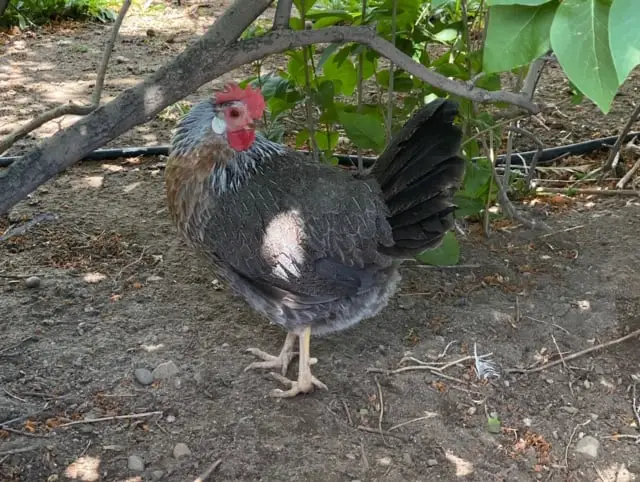Bantam chickens are very similar to regular chickens, only smaller (1/2 to 2/3 the size of regular birds), and are often much richer in color. Bantams are typically raised as domestic pets and show chickens, rather than for use as egg and meat producers.
Bantam Chickens have a life expectancy of 4-8 years.
Of course, these feathered little friends can die earlier than 4 years due to illness, accident, predators, etc. However; it is not uncommon for bantam birds to live as long as 8 years depending on their breed, environment, and care. The majority of bantam chickens will live from 4-8 years.
These little hens can lay eggs well for 2-3 years. The eggs are smaller than normal sized chickens, but they are great for eating. Most Bantam hens will lay eggs for up to 6 years, but the number of eggs will decrease after 3 years. The eggs are less frequent as they get older, but they are larger.
Factors in life expectancy
There are a few factors in how long a bantam chicken can live. The main factors being:
- Breed
- Food
- Water
- Housing
- Environment
- Diseases and parasites
Breeds
There are about 400 plus different varieties of bantam chickens. It is absolutely amazing how many different colors, feathers, and shapes there are. I think I see more new varieties every year. These little chickens have made their way into the hearts and coops of chicken lovers around the world.
The interest in Bantam chickens began when sailors would stop into Bantan Indonesia. They were intrigued with these small chickens. They were much smaller than the chickens back at their home port. The word Bantan eventually got turned and mangled into the word Bantam over the years.
Bantam chickens are now found all over the world. There are 3 main types of Bantam chickens, true, miniaturized, and developed.
True Bantam chickens are a naturally occurring small chicken. They have not been developed from a larger breed. They have not been developed by mankind for their size, feathers, or colors. These are the small chickens that the sailors found originally in Bantan Indonesia. Some of these breeds include: Rosecomb, Nankin, and Sebright.
Miniaturized Bantams are derived from standard breeds. They have been selectively bred over the years to have the standard breed of larger chickens in a Bantam size. Some successful standard miniaturized breeds are: Cochin, Rhode Island Red, and Orpington.
Developed Bantams are breeds that have been heavily bred and influenced by man. The developed bantam breeds will have some unclear origins. Some bantam breeders will cross several different bantams to come up with a whole new variety. Thus, adding to the 400 plus varieties. Some of these developed breeds include Japanese, Pekin, and Belgian.
The breeds that have proven heartiest are the original true Bantam breeds and the miniaturized breeds. Many of the Bantam chickens will live a long time as long as they are well taken care of.
Food
Bantam chickens will eat a lot less than a regular chicken. They will only eat a pound to a pound and a half a month of food. We feed ours a combination of scratch grains and laying mash to supplement their free-range foraging. We do this to ensure that our feathered friends have the proper nutrition to keep living happy and healthy.
We also have grit available for them. It is also important to have calcite or crushed oyster shells for them especially if they are laying eggs.
Water
Bantam chickens will require a lot less of everything including water. They will require a good clean source of water to keep them healthy. If you ae using a water bottle style waterer you will want to keep it clean and scrub it out once or more a week.
Wild birds will often use these bottle style reservoirs of water. Many of these birds can come from all over the world. Sometimes they can bring bacteria with them. Generally, it isn’t much of a problem if you keep the water clean and fresh.
Housing
Bantam chickens do not need much room. In fact, many Bantam owners just have little cubby’s around the yard for the little birds to live in. If you do set up a coop you will need to make sure it has a cover or netting over the top. Bantams are a lighter bird and can be pretty good flyers. Much better than the larger regular sized chickens. This added step of precaution will help extend the life of your little chickens by not becoming lost or victim to a predator.
Little Bantam chickens can be a good option for a chicken tractor. Especially in smaller yards and gardens.
Just have a good adequate housing option for your little Bantams and they will live for years and years.
Environment
The environment that the Bantam chickens live in can add to their lifespan as well. A nice area where they can free range will make them happier and healthier. You will need to have plenty of places for the little birds to hide away safely from a hawk, falcon, or other predator.
If they are cooped up in a cage their whole life, they will have a shorter lifespan and can be exposed to bacteria that builds up in a cage environment.
If the little birds are exposed to extreme weather conditions, it can shorten their lifespan as well. Bantams just like other chickens will need to be able to get out of the wind, snow, and rain to maintain good health.
Disease and Parasites
Disease and parasites will create havoc on any animal including Bantam chickens. Just as in traditional flocks there are diseases that chicken owners battle. We have a great article here on treating chicken illnesses. You can use the information to treat your Bantam chickens, just adjust the dosage to the size of the Bantam chicken.
Make sure the little chickens have access to a dust bath as well. Here is an article we wrote about dust baths and the benefits of them. The dust bath is the way many of these birds will ward off pericytes and keep clean and healthy.

Summary
Bantam chickens are a great addition to your yard and can live for a long time. Many bantams will live on average from 4-8 years. There are however many Bantam chickens that have been living well beyond 10 years. I have heard that one Bantam chicken was recorded to have lived for 16 years as a house pet.
Anyway, Bantams can live a good long productive life if taken care of and provided for.

